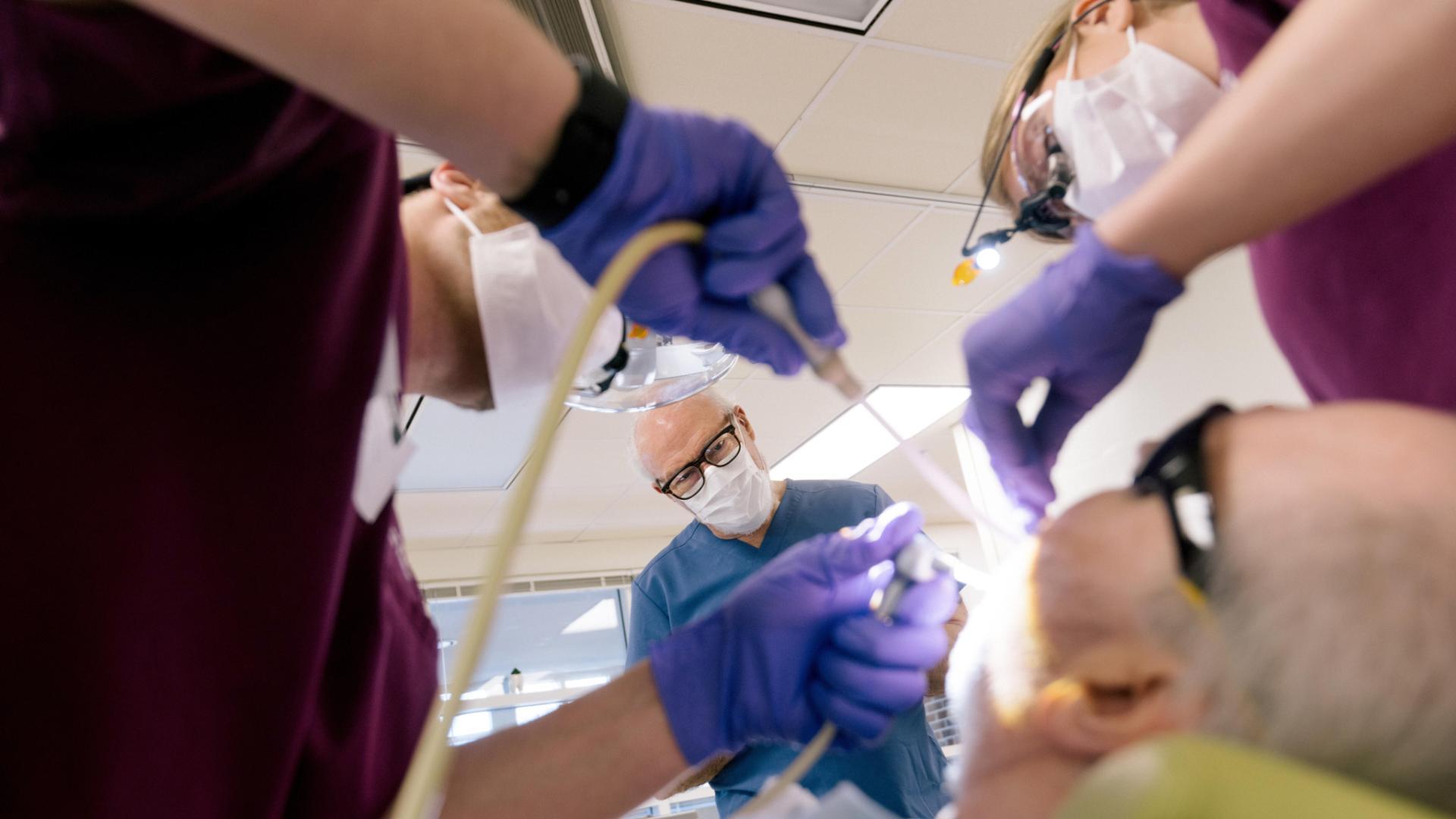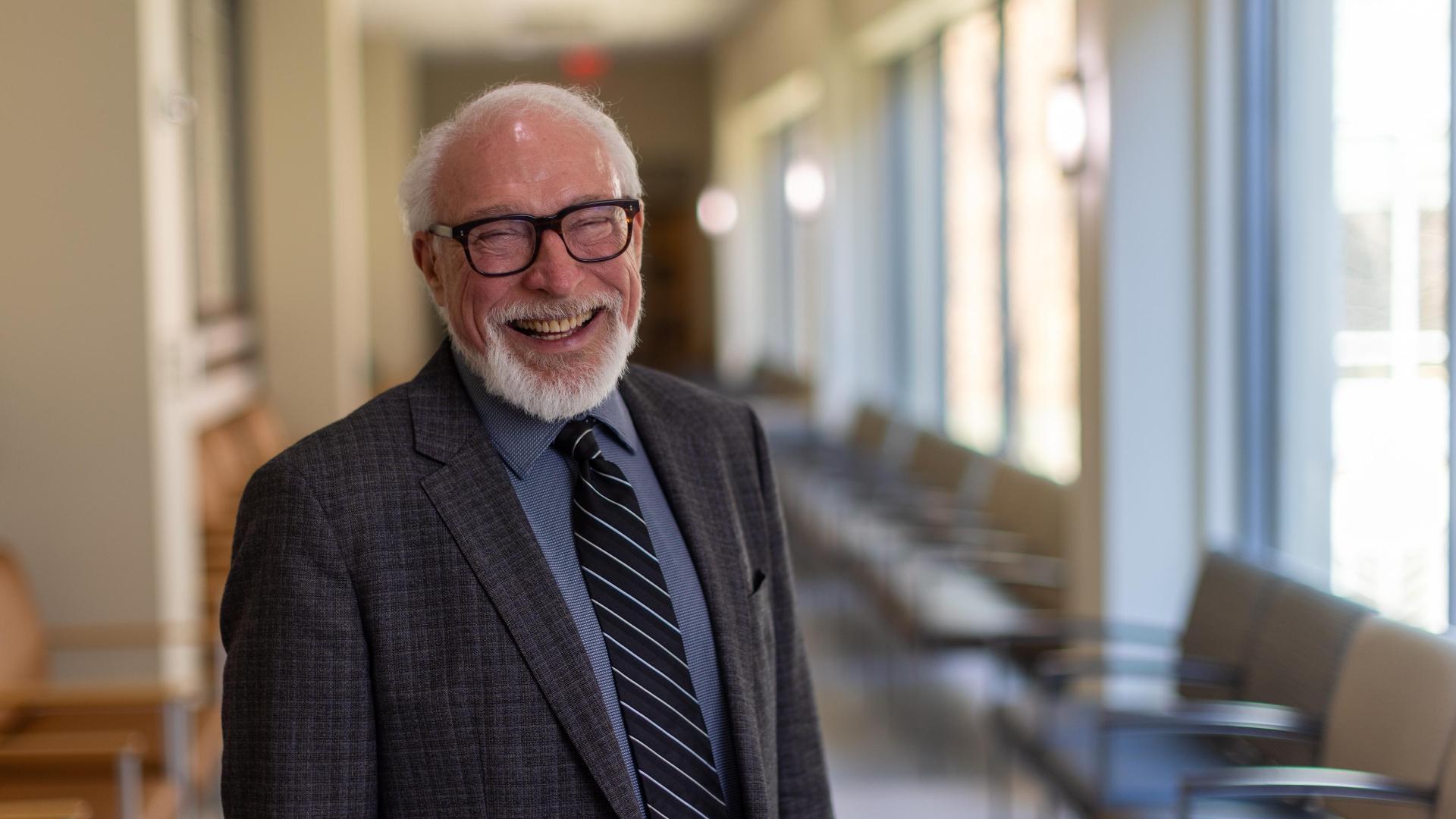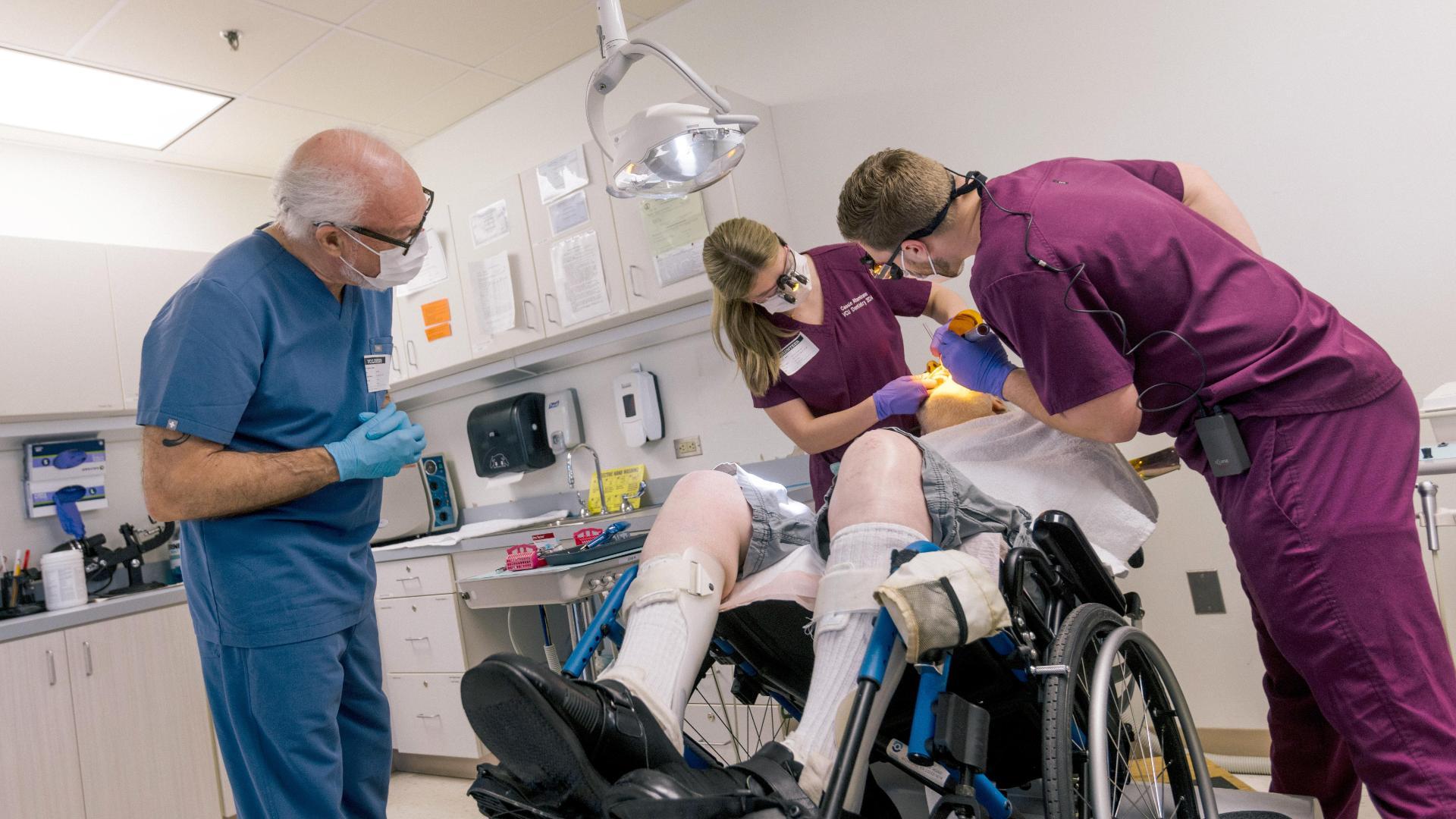 Dr. Wood supervises students as they provide care to one of the residents of The Virginia Home, one of VCU School of Dentistry’s Service Learning Program partners. (Photo credit: Daniel Sangib Min, MCV Foundation)
Dr. Wood supervises students as they provide care to one of the residents of The Virginia Home, one of VCU School of Dentistry’s Service Learning Program partners. (Photo credit: Daniel Sangib Min, MCV Foundation) All smiles: Alum’s major gift establishes clinic for patients with disabilities
This article was originally featured in the MCV Foundation's spring 2024 edition of Chronicle of Giving and in the spring 2024 edition of Dentistry magazine, published by the school’s Communications Department.
“‘When do we get kicked out?’”
The heartbreaking question was a familiar one to Dr. Roger Wood (D.D.S. ’75). He had heard it over and over throughout his decades as a pediatric dentist from desperate and weary parents of children with disabilities. These parents were used to hearing from service providers, educators and countless others that their kids would eventually age out of services, as if the children’s needs somehow lessened when they turned 12 or 17 or 21.
These parents assumed Wood would cut ties, too.
They were wrong.
Not only did Wood embrace his patients with disabilities into their teens and adulthood, establishing a “practice within a practice” at his dental office in Midlothian just for these patients, he and his wife, Karen, are now working to ensure future dentists are positioned to do the same.
The couple are leading the charge to establish the Roger Wood Special Care Dentistry Clinic within the VCU School of Dentistry. The clinic, scheduled to open this winter, will provide training and exposure to patients with disabilities for dental and dental hygiene students. It also will serve as a much-needed care provider for this community.
In addition, the clinic has the potential to integrate other university resources, including social work and occupational therapy, to provide a multidisciplinary, patient-centered approach to care that extends beyond dental needs. The effort to create the clinic is being further bolstered by an unrestricted bequest from the estate of the late Dr. David Childress (D.D.S. ’89).

Adapting to growing patients’ needs
Wood grins a lot. His good-natured personality is infectious. He retired during the COVID-19 epidemic after more than 40 years as a pediatric dentist, and in those years, his practice welcomed everyone.
He wore cowboy boots in the office, and he recalled how his youngest patients would do the same when they came in for appointments.
“I love working with kids,” Wood said. “It’s fun — I’m a hyper person, and that worked well for me.”
That wide grin fades, however, when he talks about the disabled community.
Unlike other dental specialty areas, pediatric dentists are well-suited to help children with disabilities, he explained, because with children, gaps in development among those with disabilities and others are not as wide. Problems begin as the children grow up, however.
Many pediatric dentists stop seeing patients with disabilities when they reach teen years because the dentists don’t know how to adapt to challenges of their size and disability as they age into adulthood. That, and they prefer to avoid disruptions for other patients if the disabilities patients are loud or become physically challenging.
“It takes a long time to see an adult patient with disabilities,” Wood said. “As they age, they get stronger, and you have to know what you’re doing and like what you’re doing.”
He became an inclusive service provider, he said, simply because he said “yes” to inquiries from parents when other dentists did not.
“There are not a lot of places they can go,” Wood said about older children and adults, noting that by the time he retired, nearly one-third of his time was spent with patients with disabilities. As a former chief of dentistry at Johnston-Willis Hospital, he explained that if his patients needed dental work under sedation, he had access to the hospital’s operating room.
One of those patients was Christopher Carroll.
Christopher, now 27, has cerebral palsy and is legally blind, deaf and nonverbal.
His mother, Nora Carroll, recalled that Wood was highly recommended to her years ago and despite a 30-minute drive. Christopher and his two younger siblings were patients of Wood for nearly 20 years.
“When Christopher was young, the difference between a neurotypical child and a child with disabilities wasn’t so large,” Carroll said. “But as he got older, the gap increased, and Wood adapted to all those different needs.”
Carroll said Christopher’s patience with his dental appointments decreased as he got older, so his appointments were moved to a private room with fewer distractions.
More assistants were needed to physically help Wood. On one occasion when Christopher needed a tooth extraction, Wood did so at the hospital so the young man could be sedated.
“It was fantastic and made the process so easy,” she said. Now she’s not sure what the future holds.
Since Wood retired, Carroll has not found a dentist for Christopher who has hospital access to allow him to be sedated for deep cleanings and other dental needs.
“The pediatric dentistry world is helpful,” she said, because pediatric dentists understand the guessing game that parents of children with disabilities experience in trying to determine why their children, even those who are nonverbal, are sick or cranky. “But doctors rely highly on feedback from adult patients, and when they can’t get that, they don’t know what to do.”

Giving back
The Roger Wood Special Care Dentistry Clinic will be located on the first floor of the Lyons Dental Building near the dentistry school’s valet parking entrance, improving convenience for patients. It will be a quiet space, away from the hustle of the school’s existing dental clinic, so families and patients have privacy and wheelchair accessibility.
Lyndon F. Cooper, D.D.S., Ph.D., dean of the VCU School of Dentistry, said VCU has a responsibility to care for all patients and to teach future oral health professionals how to care for a diverse population. He said the school’s recent efforts to increase access to care coincide with the Woods’ vision.
“Fortuitously, the school’s intentions intersected with Wood’s passion for providing care to patients with disabilities,” Dean Cooper said. “In expanding our ability to care for these folks, our community will benefit, and our students will gain experience they will carry throughout their careers. We are extremely grateful for the Woods’ gift, which holds the promise of remarkable oral health care for those who previously had little opportunity.”
Wood, now an affiliate faculty member at the VCU Department of Pediatric Dentistry, will teach in the clinic.
It is yet another example of his and his wife’s outreach. For years, the Woods participated in Missions of Mercy projects through the Virginia Dental Association Foundation and partnerships with the VCU School of Dentistry.
Those projects provide high-quality dental care in areas around the state that lack sufficient dentists.
“Our hope is that enough students go through the program so they’re comfortable with patients with disabilities,” Karen Wood said. “Then they have the heartstrings to help these people.”
Wood echoed those thoughts. “I had a very successful practice for a long time because of people who supported me,” he said, referring to both longtime patients and staff. “The clinic is a good way for me to give back.”
Jeff Johnson, D.M.D, chair of the Department of Pediatric Dentistry at VCU School of Dentistry, credited the Woods with thinking outside the box to create a synergy with other specialties that could offer additional services for patients while they are on the MCV Campus — everything from therapy to transportation and social services.
“Dr. Wood’s life legacy has been about providing care for people who wouldn’t otherwise get it,” Dr. Johnson said. “With the Woods’ leadership and guidance, we’re breaking ground on a transformative experience for patients, for dental students and every learner in this building.”